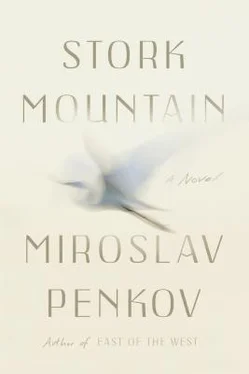Miroslav Penkov - Stork Mountain
Здесь есть возможность читать онлайн «Miroslav Penkov - Stork Mountain» весь текст электронной книги совершенно бесплатно (целиком полную версию без сокращений). В некоторых случаях можно слушать аудио, скачать через торрент в формате fb2 и присутствует краткое содержание. Год выпуска: 2016, Издательство: Farrar, Straus and Giroux, Жанр: Современная проза, на английском языке. Описание произведения, (предисловие) а так же отзывы посетителей доступны на портале библиотеки ЛибКат.
- Название:Stork Mountain
- Автор:
- Издательство:Farrar, Straus and Giroux
- Жанр:
- Год:2016
- ISBN:нет данных
- Рейтинг книги:4 / 5. Голосов: 1
-
Избранное:Добавить в избранное
- Отзывы:
-
Ваша оценка:
- 80
- 1
- 2
- 3
- 4
- 5
Stork Mountain: краткое содержание, описание и аннотация
Предлагаем к чтению аннотацию, описание, краткое содержание или предисловие (зависит от того, что написал сам автор книги «Stork Mountain»). Если вы не нашли необходимую информацию о книге — напишите в комментариях, мы постараемся отыскать её.
Stork Mountain — читать онлайн бесплатно полную книгу (весь текст) целиком
Ниже представлен текст книги, разбитый по страницам. Система сохранения места последней прочитанной страницы, позволяет с удобством читать онлайн бесплатно книгу «Stork Mountain», без необходимости каждый раз заново искать на чём Вы остановились. Поставьте закладку, и сможете в любой момент перейти на страницу, на которой закончили чтение.
Интервал:
Закладка:
“I’m a baker’s shovel, Grandpa,” I told him, only half as a joke. I could turn this way or that depending on whose hands held me. One moment I believed one thing, the next another. But I’m not sure he heard me.
“I first came to teach in Klisura when I was thirty-three,” he said, and, cradling the lamp in his arthritic hands, he sat at the foot of my bed. “Right from my first day here, one predicament became very clear: there was no school. So I built it. And then another: there were no students. So I set forth to find them. I still remember two little twin boys. Lived up a hill with their father. Shepherds. I found them outside their hut, washing sheep bells in a trough of milk. So the bells might sing more sweetly, they told me. I sat in the grass and watched them, two boys and their father, dip bell after bell in yellow milk. I didn’t ask them where their mother was. The sun was setting when they hung the bells to dry across a wooden framework behind the hut. The father picked up his boys, one in each hand, and let them shake the framework. The bells rang and their ringing rolled down the hill and up another where other shepherds rang other bells. Soon the whole Strandja was ringing, as far south as Turkey and even Greece.
“My boy,” Grandpa said, staring into the fire locked behind the glass, “an old man’s mind is a mountain, each memory a milk-washed bell. It’s true, God holds the future, which is uncertain and unknown, so let him hold it. But the old man holds the past. The past is certain. No god can summon it before him and rearrange it at his will. The old man can. An old man walks hill to hill and rings the bells, and bids to appear in their sound the long-gone days — a day from fifty years back as loud as another not even a fortnight old. And so the gods grow jealous of the old man. They hold the Cup of Lethe to his thirsty lips. Tempted, he drinks. His feet grow weak and then he limps from hill to hill. His feet give way. Gone is the old man’s strength to ring the bells.
“It’s been too long a silence,” Grandpa said, and closed his eyes. “I want to shake the wooden frame. I want my head to ring, from hill to hill across the Strandja.”
His eyes were muddy when he blinked them open, the kind of mud I’d learned to fear.
“Grandpa,” I said, “lie down. It was a hard day. Get some rest.”
But he cradled the lamp and the fire and when he looked my way I knew it wasn’t me he was seeing.
“I was seventeen that spring,” he said. “May 1944. It had been a bad winter, so bad the Danube froze in places and a fever crawled in across the ice from Romania.”
When the ice melted, the fever spread. Left and right people were burning. Children and women began to die. Whole families fled to seek shelter as far south as the Balkan Mountains. One dawn, Grandpa’s cousin — he was a year older — came to his house, panting. “Pull up your britches,” he cried, “and run with me to the square. They’re recruiting men for heroic business.” The elders from their village had met the elders from two others. They had decided to assemble a band of kalushari and send them from one house to another to chase the fever back whence it had come. When his cousin said kalushari , Grandpa’s heart leapt like a kid goat. Had he not seen them as a little boy, passing outside his grandfather’s house one morning on their way to cure the sick? Men like mountains. Bells on their sandals to raise a proper ruckus and scare the demons off. Their britches embroidered with silver and those silver threads flashing like bolts of lightning. Their shirts white like goose feathers, and on their chests bloodred kerchiefs like flapping wings. Daggers in their sashes, sabers and sickles in their hands, and sharpened cudgels with their bases shod in iron. Their eyes spilling fire, their jaws clenched so hard you could hear the bone crunching. And fresh herbs on their fur caps — smelling so sweet your eyes watered. One man walking in the steps of the other, grave and quiet, greeting no one and speaking to no one, not even to the little boy, running behind them. Sickness chasers, death hunters. And did Grandpa not remember how the maidens had watched them, misty-eyed, their long lashes flittering so quickly they raised the dust off the road in thick puffs? Filling their nostrils with the smell of the fresh herbs, with the men’s sweat, licking and biting their red lips? And their hearts thrashing so hard under their plump bosoms that even he, the little boy, had heard their knocking and taken fright, though with pleasure?
“No girl can resist the kalushari ,” his cousin told him, as if Grandpa didn’t know this already, and they flew off to the square. “If they choose me,” his cousin said, “I’m taking Kera. So what if she’s getting married? And that Sevda you’ve been pining over, she’ll kiss your feet if they choose you.”
“It’s true, my boy,” Grandpa said sweetly. “She was a beautiful girl, my Sevda. Lovely smile, eyes, bosom. But she didn’t want me. ‘Look at yourself,’ she’d say, and her friends would giggle. ‘My grandmother’s mustache is thicker than the moss on your lip. A peach’s moss is thicker. Grow a beard, man up a little. Then come again to ask me.’”
That morning all the boys from Grandpa’s village gathered on the square. Only those older ones, who had run up to the woods with the Communist partisans, only they were missing. And the girls too came that morning, those devils, to ogle them. There was his cousin’s Kera, though she was getting married, and there was his sweet, dear Sevda, eating a fresh pretzel and licking her red lips.
The boys formed a long line, shoulder to shoulder, and this giant, this colossus of a man, stood before them. His britches were embroidered with silver; his shirt was whiter than snowdrop petals. So white, Grandpa’s eyes hurt to watch him. Geranium, dock, and wormwood adorned the giant’s fur cap, and in his hand he brandished a cudgel, sharpened like a spear, with bells on its top and its bottom cast in copper. Three times the giant smacked the cudgel on the ground to get their attention, and three times the cudgel sang, its bells ringing.
“I am the vatafin ,” the colossus told them, “leader of the kalushari . My father was a vatafin , and my grandfather in Romania, he too was a vatafin . I’ve come here to choose six of you, muttonheads, the strongest, so we can go after the fever and wrestle her down, that serpent, and chop her three heads off.”
The village elders were there on the square and so was the mayor. The gendarme had come to see if this circus was perchance partisan-related. Back then the tsarists were awfully scared of the partisans and they could sense that a bad storm was brewing. Even the priest had showed up fuming. Godless pagans, he called the people, and waved his iron crucifix in the air; but the women chased him away, the righteous, for hadn’t he left their children dying?
Then the boys were given each a pick or a shovel. “Dig a pit,” the colossus ordered, and they dug a hole, one meter deep and five meters long, just like he wanted. A cart arrived full of chopped wood, and they built a fire there in the pit and when the flames burst out like so many tongues of the plague-fever, the boys crossed themselves three times, slack in the knees with terror.
“Whatever you do,” his cousin whispered in Grandpa’s ear, “don’t shame yourself. The women are watching.”
“My beautiful Sevda,” Grandpa said, and his eyes moved left, right, left, as if she were skipping lightly before him. “The Fever took her three months later. Her smile, eyes, bosom — food for the maggots. We really were muttonheads, my boy, on the square that morning, standing before a pit spitting fire. Fever slayers and death chasers. He-goats with their balls bursting with pride and desire.”
Читать дальшеИнтервал:
Закладка:
Похожие книги на «Stork Mountain»
Представляем Вашему вниманию похожие книги на «Stork Mountain» списком для выбора. Мы отобрали схожую по названию и смыслу литературу в надежде предоставить читателям больше вариантов отыскать новые, интересные, ещё непрочитанные произведения.
Обсуждение, отзывы о книге «Stork Mountain» и просто собственные мнения читателей. Оставьте ваши комментарии, напишите, что Вы думаете о произведении, его смысле или главных героях. Укажите что конкретно понравилось, а что нет, и почему Вы так считаете.











